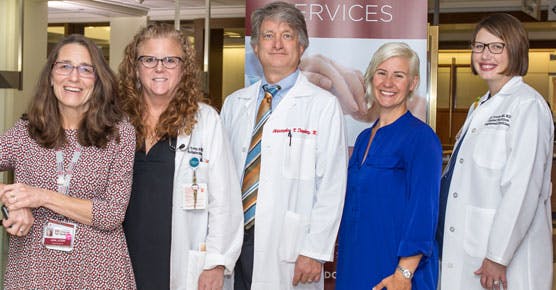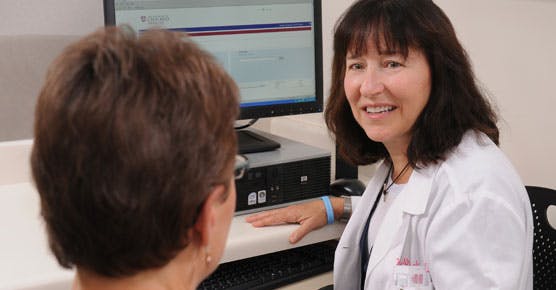Geriatric Oncology Services & Support
Comprehensive Geriatric Assessments: A Foundation of Care Management for Older Adults
Older age alone is not a sufficient reason to prevent a person from receiving effective cancer care that may extend their life. Yet it's crucial to identify — preferably in advance — possible problems that may affect care outcomes in older patients to take steps to reduce risks and better prepare them for treatment.
At the University of Chicago Medicine Specialized Oncology Care & Research in the Elderly (SOCARE) clinic, our approach to care planning includes comprehensive geriatric assessments that evaluate the following factors:
- Overall health of the patient
- The presence of co-existing diseases, such as diabetes or heart disease
- Functional ability to perform tasks of daily living, such as medication management, bathing and dressing
- Frailty and physical weakness, as well as difficulties with walking or balance
- Behavioral or mood concerns, including anxiety and depression
- Memory impairment
- Nutritional needs
- Medication review to avoid dangerous interactions
- Social and family support assessment to assist during and after cancer treatment
Tailoring Care for Older Cancer Patients
SOCARE physicians work with either primary care physicians and/or specialists and use results from the comprehensive geriatric assessment to develop individualized care recommendations. At the SOCARE clinic, we aim to:
- Establish care goals with patients, family members and physicians. The patient's quality of life and wishes for care are the priority when setting treatment goals.
- Identify instances where special care considerations are required to reduce the risk for complications. Examples include anticipating when patients may be more vulnerable to side effects from treatment.
- Assist patients and families with navigating the cancer care process. An advanced practice nurse and other SOCARE staff can help coordinate appointments with treatment specialists and make sure patients and family members are informed about what to expect during treatment.
- Coordinate resources that address the overall care needs of the patient, including pain and other symptom management, home care assistance or rehabilitation care and psychosocial support.
- Arrange for palliative care or hospice care, if appropriate, and answer questions and ease concerns related to high quality end-of-life care.
Serving as Patient Advocates
Ultimately, we serve as a trusted resource to help older patients achieve their care goals and maintain the highest quality of life. When appropriate, this means advocating for older patients to receive the full spectrum of cancer treatments — including aggressive options and clinical trials. Alternatively, we assist patients and families who wish to minimize care measures at the end of life.
Conducting Research to Improve Cancer Care for All Seniors
Our geriatric oncology leaders actively collaborate with other experts from throughout the United States to advance the field and share research that promises to benefit all seniors with cancer.
Our Geriatric Oncology Locations

Helping You Cope With Cancer
Our Supportive Oncology program offers a range of services to support you and your family during your cancer treatment.

Cancer Care Second Opinions
Request a second opinion from UChicago Medicine experts in cancer care.

